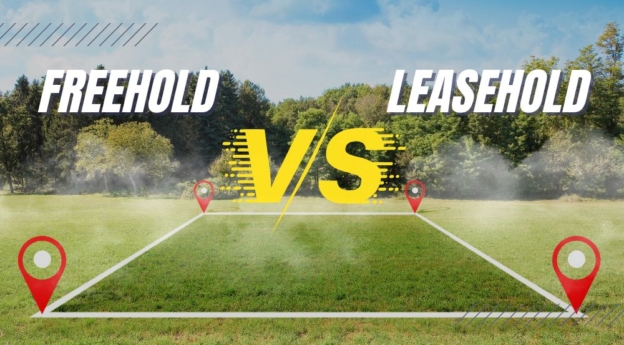🏡 Freehold vs Leasehold: What’s the Difference When Buying Land?
If you’re planning to buy land—whether for a home or investment—one of the first questions you’ll face is:
Should I buy a freehold or a leasehold property?
You’ve probably heard both terms before, but what do they really mean? And how do they affect your ownership, rights, and long-term plans?
Let’s break it down in simple terms so you can make the right choice.
🟢 What is Freehold Land?
When you buy a freehold plot, you own the land completely and permanently.
✅ Key Features:
- You own both the land and the structure (if any)
- Ownership is forever, with no expiry date
- You can sell, lease, or modify the property as you wish (within local laws)
- Typically located in private layouts, approved colonies, or independent areas
🧠 Think of it like this:
You bought a car, and now you’re the full owner—you can drive it, repaint it, or sell it whenever you want.
🔵 What is Leasehold Land?
A leasehold plot means you’re buying the right to use the land for a fixed period, usually from a government authority or institution.
⚠️ Key Features:
- Land is leased, not fully owned
- Lease terms are typically 30, 60, or 99 years
- You may need approval for resale, modification, or construction
- After the lease ends, you may need to renew it or return the land
- 🧠 Think of it like this:
You’re renting a car for a few years—you can use it, but the company still owns it, and there are conditions attached.
🏙️ Which Is Better for You?
✅ Choose Freehold if:
You want long-term ownership
You’re building a home or looking for high appreciation
You want full freedom over your property
✅ Choose Leasehold if:
The lease is long (like 99 years) and you’re okay with conditions
You’re buying in a government-allotted scheme or institutional township
You’re looking for lower initial prices
📌 Real-World Tip (Especially in Cities Like Nagpur)
In cities like Nagpur, most private layouts offer freehold plots, while government-allotted schemes (like from NIT or MHADA) may offer leasehold options. Always check the land title and tenure before you buy.
If it’s leasehold, ask:
- Who owns the land?
- How long is the lease?
- What happens at lease-end?
- Can it be converted to freehold?
🧾 Final Words
The difference between freehold and leasehold land isn’t just technical—it affects your rights, costs, flexibility, and future plans.
Always:
- Ask for full legal documentation
- Work with a verified developer or agent
- Consult a lawyer if you’re unsure
When in doubt, freehold is usually the safer, more flexible option—especially for first-time buyers or long-term investors
